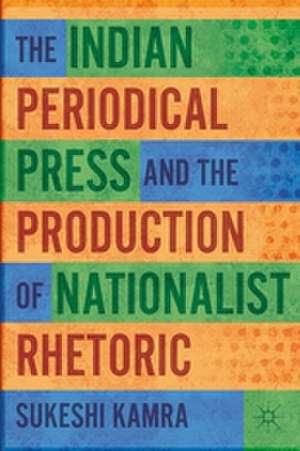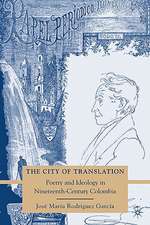The Indian Periodical Press and the Production of Nationalist Rhetoric
Autor S. Kamraen Limba Engleză Hardback – 30 noi 2011
Preț: 386.81 lei
Nou
Puncte Express: 580
Preț estimativ în valută:
74.02€ • 80.38$ • 62.18£
74.02€ • 80.38$ • 62.18£
Carte tipărită la comandă
Livrare economică 23 aprilie-07 mai
Preluare comenzi: 021 569.72.76
Specificații
ISBN-13: 9780230116597
ISBN-10: 0230116590
Pagini: 236
Ilustrații: XI, 236 p.
Dimensiuni: 140 x 216 x 20 mm
Greutate: 0.39 kg
Ediția:2011
Editura: Palgrave Macmillan US
Colecția Palgrave Macmillan
Locul publicării:New York, United States
ISBN-10: 0230116590
Pagini: 236
Ilustrații: XI, 236 p.
Dimensiuni: 140 x 216 x 20 mm
Greutate: 0.39 kg
Ediția:2011
Editura: Palgrave Macmillan US
Colecția Palgrave Macmillan
Locul publicării:New York, United States
Cuprins
If Vox Populi be Vox Dei': Why the Periodical Press is Arresting 'Ungoverned Imaginings': The Periodical Press, Government Culture, and the Making of the Indian Public, 1870-1910 Native Revolt: Verbal Culture of 1857 and the Politics of Fear Law and the Periodical Culture of the 1870s: A Culture of Complaint or Something More? Criminalizing Political Conversation (1): The 1891 Trial of the Bangavasi The 'Infernal Machine' of Propaganda Literature: The Native Press of 1907-1910 Criminalizing Political Conversation (2): The 1910 Trial of the Pallichitra
Recenzii
"Meticulously researched, theoretically sophisticated, and elegantly written, this is an innovative and imaginative study of the role played by the Indian Press in the making of an anti-colonial Indian nationalism during and after the 1870s. Drawing on government surveillance reports on the press and the wide range of Indian newspapers, Kamra makes known the alarm of the British bureaucrats and the aspirations of the journalists, describing this as one of the many dramas played out during the Indian nationalist struggle. Although without an identifiable constituency, the columnists imagined a public whose aspirations they claimed to voice, and in the process created an incipient public sphere and political culture. In showing how the oppositional substance and tone of many articles and the patriotic rhetoric of self-determination reached and fed into the popular protest of the illiterate, Kamra properly assigns agency to the masses, too often occluded in accounts of anti -colonial nationalism. At the same time she is unsparing in her observations that writings emanating from an educated elite were spoken in accents of cooperation as well as insurrection. The book is a significant contribution to the large field of resistant nationalisms and will be of in interest to literary scholars as well as historians and political scientists." - Benita Parry, professor of English, Warwick University"This is a valuable contribution to the history of print and its role in the constitution of the modern public sphere. Bringing to bear the critical lens of postcolonial cultural studies on a rich array of archival materials, Sukeshi Kamra's account of British colonial surveillance in the late nineteenth century provides key lessons about the double-edged function of the press in political culture. Kamra's cogent analysis and keen sense of where the fault lines lie bring into sharp relief the startling turnabouts of power and tactics between the rulers and the ruled. Documenting the inevitable rise of public opinion, public sphere and a public despite the expansion of coercive state mechanisms, this book is an important repositioning of key debates about Indian nationalism. It is a welcome addition to existing scholarship on the historical conjuncture of print capitalism, the middle class, the nation state, and democratic politics." - Betty Joseph, author of Reading the East India Company 1720-1840: Colonial Currencies of Gender
Notă biografică
SUKESHI KAMRA Professor ofEnglish at Carleton University, Canada.


















